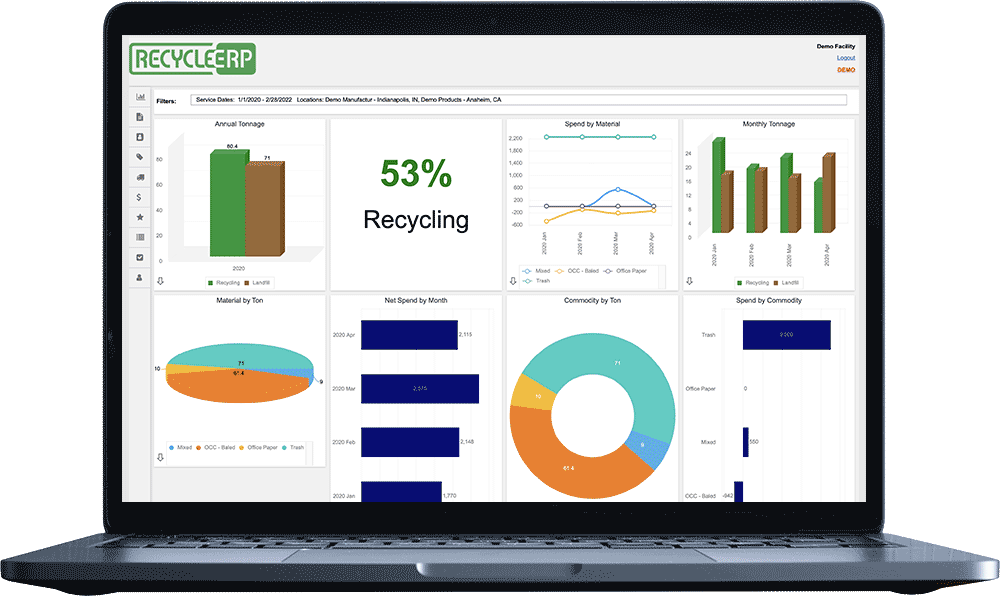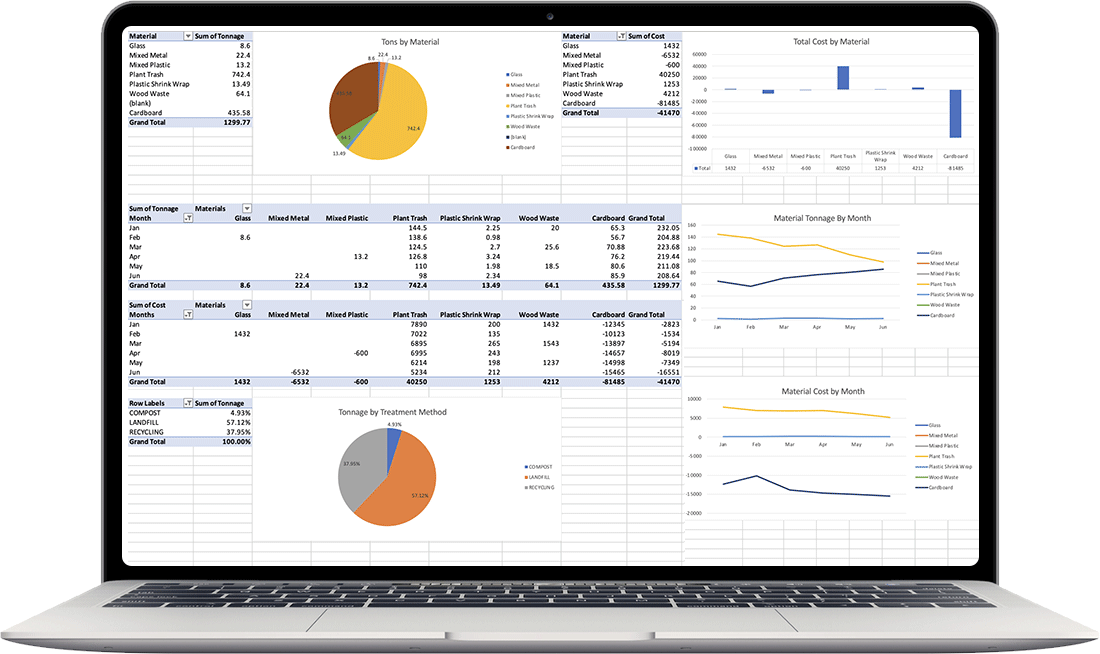Running a waste brokerage business is logistically complex and surprisingly data-intensive. For many waste brokers, data lives in spreadsheets, order management and billing systems, in-house databases, hard copy file folders, and a myriad of other locations. Dispersed data makes it harder to understand successes, failures, and opportunities; however, just keeping pace with orders can consume most of a broker’s focus, leaving little time for back-office improvements.
In this blog post, we’ll discuss why some waste brokers are trading in spreadsheets and disparate business systems for recycling ERP software.
ERP Basics
“ERP” is short for “enterprise resource planning” and refers to a type of software that’s used to manage ordering, invoicing, inventory, reporting, and other processes. Think of an ERP as a “one-stop shop” for managing your day-to-day operations.
Large enterprises with complex supply chains, multiple lines of business, large order volumes, and/or numerous facilities are the heaviest users of ERP software. For example, a multi-national manufacturing organization might rely on its ERP to track customer orders and fulfillment statuses, raw material costs, production output, and warehouse inventory levels.
Small and mid-sized organizations have been slow to adopt ERP technology due to the upfront and ongoing infrastructure, licensing, and technical support costs.
ERPs are powerful—but they can also be very expensive.
What is Recycling ERP Software?
Recycling ERP software is an enterprise resource planning system that’s built for the unique needs of the waste and recycling industry. Features will vary from one vendor to the next, but recycling ERP software should at least support the following use cases:
Order and customer management: Organizing your customer records and communication, service requests, and invoices from a central location.
Billing and vendor management: Tracking vendor-related contact information, initiating payments, tracking expenses, etc.
Reporting: Generating business reports for internal users and tracking key metrics for clients, such as landfill vs. recycling percentages.
Pricing and rebates: Ensuring the right price is charged to customers for each material and service. Handling rebates without manual data manipulation or analysis.
Flexible user access: Providing users the right levels of access to perform their specific jobs, such as data entry, equipment scheduling, or invoice review.
Thanks to advancements in cloud technology, ERP technology is now feasible for waste brokers with modest IT budgets. For example, our RecycleERP system is delivered as a SaaS (Software as a Service) with a fixed monthly fee. There’s no IT hardware to set up or maintain, which could save you a lot of money and frustration.

Potential Benefits of Recycling ERP Software
Consolidating your processes, workflows, and data into recycling ERP software could yield numerous efficiencies that make it easier to achieve the following objectives:
- Building a scalable business model that is less reliant on manual processes
- Streamlining reporting and data analysis
- Locating and using customer, vendor, transactional, and other information
- Minimizing overlapping sources of business information
- Empowering team members with the right tools to do their jobs
- Gaining a more complete view of what’s working (or not working)
Despite the potential benefits, many waste brokers have never seriously considered implementing recycling ERP software. Why? Perhaps some do not realize that recycling ERP software exists. Others may simply be too busy to research alternatives. Regardless of past reasoning, now is a good time to start evaluating your options!
Build or Buy?
Deciding whether to build or buy is a logical next step after establishing the need for recycling ERP software. Building your own software may offer maximum ownership over the source code, but you’ll also need the right technical talent (in-house and/or outsourced) and IT infrastructure, which can be costly.
Another approach involves finding a prebuilt solution, such as RecycleERP. We built RecycleERP specifically for the needs of waste companies—especially waste brokers and vendors. And, we believe RecycleERP offers a far better value proposition than the “build your own” software approach. Here are six reasons why:
- RecycleERP is a SaaS product, which means there’s no software or IT infrastructure to procure or maintain.
- Our robust feature set practically eliminates the need for third-party invoicing, billing, reporting, and relationships management tools.
- Built-in calculators handle complex pricing, billing, and rebate scenarios.
- Personalized onboarding helps you gain value faster.
- We offer fixed monthly pricing plans that fit almost any budget.
- Our experienced development team is happy to discuss your customization API and/or integration requirements.
Interested in learning more about RecycleERP? Request a live demo to explore our features and capabilities. You can also request a customized price quote by visiting our contact page.

